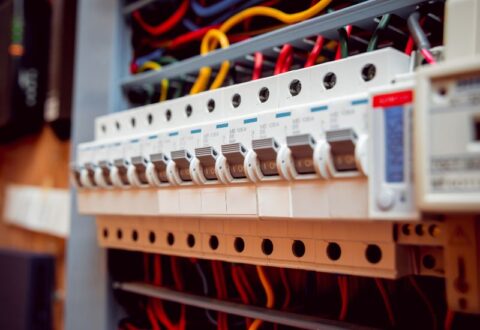What Are the Types of Circuit Breakers?

It’s easy to take your home’s electrical wiring and outlets for granted, but you rely on them for everything from watching TV and browsing the web to cooking food and vacuuming the carpet. If your wiring is configured correctly, you may never give it a second thought. But if your circuit breaker panel is old or outdated, you may have to reset tripped breakers far too frequently. Learn about the different types of circuit breakers and safety tips to keep in mind before servicing them.
What Are Circuit Breakers For?
We’ve all been annoyed by a tripped circuit breaker, but this built-in failsafe protects against dangerous electrical situations that could potentially ignite a fire. Circuit breakers are switches inside the breaker box that interrupt the flow of electricity when an electrical short or overload is detected. This can happen if too many devices are plugged into the same circuit or a sudden power surge occurs.
Are Fuse Boxes and Breaker Boxes the Same?
No. Fuse boxes use outdated technology and are only found in older homes. They contain small wires that melt when overheated to disconnect the electrical current, requiring the blown fuse to be replaced before the circuit will work again. On the other hand, circuit breakers use a switch to disconnect the current when needed. To restore the connection, simply flip the switch back on.
5 Types of Circuit Breakers
Circuit breakers have specific amp capacities and serve different circuits throughout the house. Here are the five most common types of circuit breakers you’re likely to have in your home.
Standard Single-Pole Circuit Breakers
Single-pole circuit breakers are named such because they monitor the current of a single energized wire, enough to power the lights and receptacles in one large room or a few small adjacent rooms. They usually have an amperage rating of 15 or 20 amps and are common for most 120-volt (V) household circuits.
Standard Double-Pole Circuit Breakers
Double-pole circuit breakers monitor the flow of electricity through two wires at once. You can spot a double-pole breaker by the two interlinked, side-by-side switches. This breaker trips if one or both wires short out or become overloaded. Double-pole breakers can accommodate higher amperage ratings of up to 200 amps and deliver 240V to an electrical circuit. Large appliances that require a substantial amount of energy—such as HVAC systems, electric ranges, clothes dryers, and EV chargers—demand double-pole breakers.
GFCI Circuit Breakers
You probably have GFCI receptacles installed in your kitchen and bathrooms, but it’s also possible to protect the entire circuit with a GFCI circuit breaker. Like standard breakers, ground fault circuit interrupters guard against overloading and short circuits, but they also detect line-to-ground faults. This can occur when an unwanted path forms between an electrical current and a grounded element, such as your body, creating a risk of electrocution.
GFCIs keep your home and family safe by monitoring differences between the current flowing to and from the panel. If the difference is more than 6 milliamps, the GFCI stops the flow of electricity in as little as 1/40 of a second.
AFCI Circuit Breakers
Arc fault circuit interrupters trip when arcing, or unintentional electrical discharge, is detected within an electrical wire or power cord. This occurs when the wiring becomes damaged or stripped and poses a serious fire hazard.
When an AFCI senses the electrical jump and abnormal path, it instantly disconnects the circuit before the arc builds enough heat to start a fire. Standard single- and double-pole breakers don’t always detect arcs because they only trip in response to excessive heat. For this reason, AFCIs are now required in new home builds, replacing standard breakers as the most common breakers in modern electrical panels.
AFCI/GFCI Circuit Breakers
Places like kitchens and laundry rooms require both GFCI and AFCI protection, so this dual-function breaker provides a useful way to combine both into one device. Before AFCI/GFCI breakers were available, homeowners had to install an AFCI breaker at the panel and a GFCI receptacle at the point of use to be code-compliant. If your home is newer or you’ve updated your electrical panel recently, you likely have AFCI/GFCI breakers instead of standard, GFCI, or AFCI breakers.
Circuit Breaker Safety Tips
Never attempt to install or replace a circuit breaker yourself. This is a job for a licensed electrician and may require a permit due to the dangerous, high-voltage nature of the job. If you decide to look into problems with your breaker box yourself, keep these safety tips in mind:
- Always shut off the main switch at the top of the panel before working on the electrical breakers.
- Be aware that the feeder wires leading into the electrical panel are always energized and should never be touched.
- Any new breakers must match the wiring, load capacity, and type of breaker panel you have.
- Never replace a circuit breaker with one that has a higher amp rating.
- There must be an open slot in your electrical panel to add an additional breaker. Otherwise, you may need to upgrade your panel or add a second one.
- Test AFCI and GFCI breakers monthly to ensure they are in good working condition.
Schedule Circuit Breaker Services in Fort Collins
Circuit breakers are designed to last decades, but if yours fail to stay reset, emit a burning odor, or have burn marks around them, you should hire an electrician to take a look. Allen Service is your source for circuit breaker installation, replacement, and repair in Northern Colorado.
Our professional electricians are happy to inspect your breaker box and home wiring for signs that you need an electrical system upgrade. We can also install new outlets and circuits for large appliances. With upfront pricing estimates and your satisfaction guaranteed, you can call Allen Service with complete confidence! Reach out to us at (970) 431-6574 or contact us online today to schedule circuit breaker services in Fort Collins.






